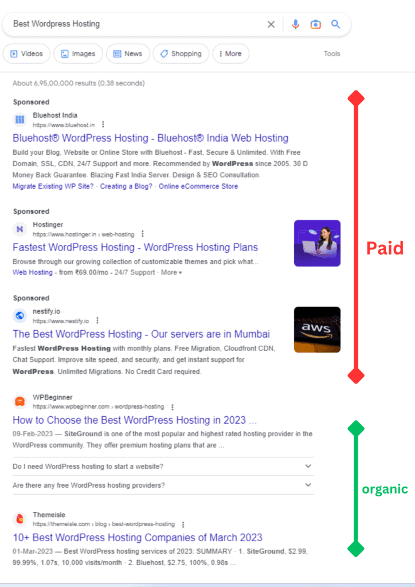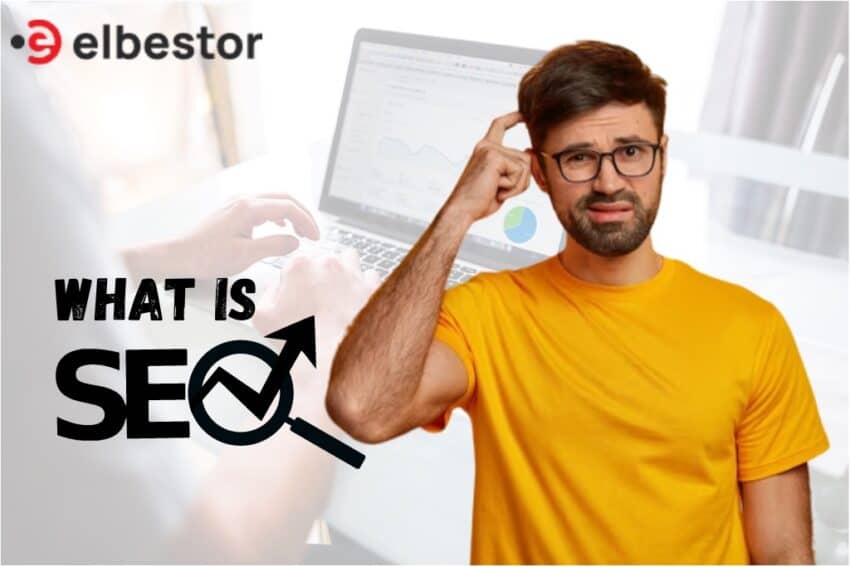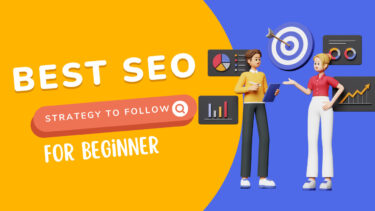Search Engine Optimization (SEO): Are you just getting started with SEO? Perhaps you’ve heard that SEO can boost your website’s ranks and increase traffic, but you’re not entirely clear on how it performs or what areas to target on. You’re in the correct place, I believe. Read on to figure out what every digital marketer should know about SEO.
Contents
- 1 What is Search Engine Optimization (SEO)
- 2 What is On-Page SEO? Your Complete Guide in 2024
- 3 What is off Page SEO? An In-Depth Guide for Newbies
- 4 Why SEO is important?
- 5 The Role of SEO in Digital Marketing?
- 6 Holistic SEO: A long-term plan
- 7 How Does SEO Work?
- 8 What Are the Different Types of SEO
- 9 Conclusion
- 10 What is SEO: FAQs
What is Search Engine Optimization (SEO)
The process of boosting organic search engine results page (SERP) traffic is called search engine optimization or SEO. Web Listings and organic search are other names for it. If you want to appear on the top result for all keywords, you must employ SEO to raise your rank.
👇 OR Another Definition 👇
SEO is an activity for crawling your website in search engines like Google, Yahoo, Bing, etc. SEO help in boosting your website ranking in SERP. SEO activity dived into two parts On-Page SEO and Off-Page SEO.
What is On-Page SEO? Your Complete Guide in 2024
On-Page SEO activity is done with your own website dashboard, which means editing webpages to add your keywords to the website in meta titles, meta descriptions, and in the content section. XML file and robots.txt setup also have On-Page SEO activity.
On-page SEO is the practice of improving a website’s search engine rankings so that it can increase website traffic.
As the name suggests, it involves making improvements to the HTML and content of the page to improve its chances of appearing higher in search engine results.
On-page SEO excludes off-page methods like building backlinks to your website or establishing domain authority because it solely focuses on individual pages.
Search engines are satisfied by effective on-page SEO that your website has high-quality content and is worthy of being ranked highly. Yet, mediocre on-page SEO might have the wrong effect on how well your site ranks.
What is off Page SEO? An In-Depth Guide for Newbies
Off-Page SEO activity is completely done on another website, In this activity don’t touch your own website only work on other websites. Off-Page SEO’s main Activities are link building. And other activities are Article Submiton, image submission, social bookmarking, directory submission, web 2.0 submission, etc.
It’s possible that off-page SEO will be more difficult to put into effect than on-page SEO. Off-page SEO involves building connections with other websites by creating quality content or getting in touch with the site owners.
Making connections is the process of link building. Many factors, including who is linking to you, how they are linking to you, and how your article is shared on social networks and online, can have a big impact on how well you rank on the SERP.
When done correctly, off-page SEO improves your website’s ranking on search engine result pages. As your site moves up the ranks, more organic traffic will come to it. Also, your business can get more qualified leads as a result.
Let’s imagine you started a blog for fitness advice, but your website doesn’t do well in organic search results. This is due to a number of factors, including:
- ✅ Your competitor’s blog has better-quality content
- ✅ You select the wrong keywords.
- ✅ You apply the wrong link-building methods.
- ✅ Your website loads slowly.
- ✅ Your website’s user experience is poor.
- ✅ By accident, Google has deindexed your website.
You must know how search engines function to rank well on the SERP. You will discover how Google ranks websites in this post, along with the many SEO strategies you should implement to optimize your ranking.
Why SEO is important?
Let’s divide our explanation of SEO into three components to better understand the benefits of SEO:
1. Results of organic searches
The unpaid results that a search engine has chosen are most appropriate to a user’s query on a search engine results page (SERP). Several SERPs contain a considerable portion of ads, more specifically PPC or pay-per-click ads. In contrast to these advertisements, organic search results are positioned according to the search engine’s organic ranking algorithms rather than advertiser bids. You cannot purchase a higher position for your page in organic search results.
2. Organic traffic quality
The quality of Organic traffic depends on how valuable your website’s content is to the user and their search query.
but if people arrive on your site believing you to be a WordPress hosting resource when in reality you are not fulfilling the intentions of use, they’re likely to exit without making a purchase.
High-quality traffic only consists of users who are really interested in the products, information, or other resources your website offers.
The search engine’s efforts to match a user’s search intent to the web pages presented in the SERP are taken advantage of by high-quality SEO.
3. Organic traffic volume
How many visitors enter your website through organic search results? Users are far more willing to click on search results that are close to the top of the SERP, therefore
Using your SEO strategy is essential if you want to rank relevant pages as high as possible. The more highly qualified visitors you attract to your website, the more probable it is that you will see a rise in worthwhile conversions.

The Role of SEO in Digital Marketing?
The goal of SEO is to increase your rank in organic search results on search engines. Several techniques are used for local results optimization, AdSense, and shopping.
SEO can still be a very profitable technique, even though it may appear that there are too many competing factors fighting for space on SERPs, pushing the organic results down.
Given that Google processes billions of search queries each day, organic search results account for a large amount of the data on the web.
While some early and ongoing expenses are required to obtain and maintain organic rankings, each click that sends traffic to your website is completely free.
Holistic SEO: A long-term plan
We apply “holistic SEO” at Elbestor. Your major objective with holistic SEO is to create and maintain the finest website you can.
You don’t try to fool Google; Instead, you put your time and effort into a sustainable long-term approach. Your odds of ranking will increase if you work to improve your pages and maintain a high-quality website.
Google seeks to provide its users with the greatest possible answers to their search queries, and the best answers frequently include excellent content and are user-friendly, quick, and accessible.
A complete SEO plan that considers every element of your website and its promotion is necessary to rank effectively in search engines like Google.
Your website’s technical aspects, user experience (UX), and content must all be of the highest order. You should create what we refer to as a holistic SEO approach if you want to maintain your high Google rankings.
Not only is a comprehensive SEO strategy better for your rankings, but it also makes it easier for consumers to access the information they seek. Also, this is better for maintaining the ecosystem.
How Does SEO Work?
Flowing are the three main steps taken by various search engines including Google to rank your site:-
- Crawling
- Indexing
- Ranking
✅ Crawling – It is the first process by search engines (Google, Bing, Yahoo, etc). search engines come to your website and crawl your full website and find how many links appear on your website.
✅ Indexing – After crawling your website, and finding all URLs then search engines index all websites’ URLs.
✅ Ranking – After indexing your website URLs, give ranking all URLs according to your website SEO Scor.
What Are the Different Types of SEO
Businesses can use a variety of tactics to optimize their websites for search engines, each with certain benefits and drawbacks.
In this blog post, we’ll examine the various SEO types and how they might support your online marketing objectives. We’ll give you a complete explanation of the different sorts of SEO, from on-page optimization to technical SEO.
This article will offer helpful insights to help you win in the field of digital marketing, whether you’re new to SEO or trying to increase your knowledge.
- On-Page SEO
- Off-Page SEO
- Technical SEO
- Local SEO
Conclusion
The secret to success is to stay in tune with the most recent trends and best practices, irrespective of whether you decide to concentrate on on-page optimization, technical SEO, or off-page techniques like link building.
You may attain long-term success and provide quantifiable outcomes for your company by using these suggestions and consistently improving your SEO approach.
So begin putting these SEO techniques into practice right away and watch as your website rises in the search results!
You can contact us at support@elbestor.com for SEO services, As we are the rising and most trusted digital marketing agency these days.
Please share this article with your friends and co-workers, if you found it helpful.
What is SEO: FAQs
Can I Do SEO Myself?
If you’ve ever doubted whether you can perform SEO on your own without a specialist or agency, the answer is an absolute yes. All you need is a website where you may put your expertise to use and your eagerness to learn new things.
How Do I Start Learning SEO?
This post is a useful starting point for your SEO education. Nevertheless, if you’re interested in learning more and/or prefer video information, check out our SEO blog or YouTube videos.
The Three C’s of Search Engine Optimization?
Content, code, and credibility are the three Cs of the foundation of SEO.







